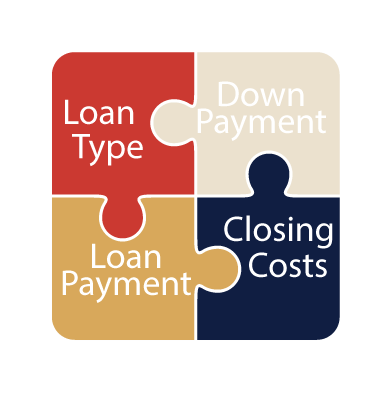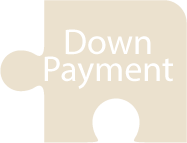Great Mortgage Interest Rates and 5-Star Service
How to get the best mortgage interest rate
Getting the best mortgage interest rate starts with talking to a professional loan officer and submitting your application. It only takes a few minutes and you can still compare rates with other lenders without lowering your credit score. Don’t be fooled by the “lowest rate” advertising because a rate is determined by several unique factors based on a complete application. Here are the facts you need to know to get the best rate and mortgage for you.
How to compare mortgages and lenders
You need some type of measuring stick to compare mortgage offerings. Otherwise, how will you know what you’re getting into? The fact is, there’s not just one measuring stick. It’s more like a little puzzle. But don’t worry, comparing mortgage options is not complicated if you know what to look for.
Once you fully apply for a loan, your lender must provide a Loan Estimate with itemized details of the rate and fees so you can compare your estimate with other offers. However, the proposed rate could change unless it is locked, and fees can vary by loan program. So, comparing apples to apples takes a little more effort than simply requesting a rate quote or looking at the numbers on a Loan Estimate. Here are the four puzzle pieces that determine the cost of a home mortgage.
Puzzle Piece #1 – Loan Type
There are dozens of loan programs to choose from depending on factors like the total amount you want to borrow, the home purpose (owner-occupied, second home, or investment property), and how much you want to put down. There are even specialty loans for rural areas, first-time homebuyers, veterans, and fixer-uppers. The most common loan programs are FHA, Conventional, Jumbo, USDA, and VA loans. The loan program and its issuer or investor (the one that eventually pays for the loan) can factor into the loan rates, conditions and fees. An Intercap mortgage loan originator can help you determine which loan type is best for you based on what’s available and the other pieces that make up this mortgage puzzle. When comparing offers, make sure you are comparing the same loan type.
Puzzle Piece #2 – Down Payment
How much you can or should put down is an important decision that can affect the rate. According to Fannie Mae, the average down payment for a new home purchase is 8%. The more you put down, usually up to 25%, the better the interest rate since the investor is taking less risk and your home serves as collateral. However, putting down 25% on a home worth several hundred thousand dollars or more may not be in your budget or your best interest, even if the APR ends up a little higher. Paying a little more each month over paying a very large down payment makes sense to a lot of buyers.
Puzzle Piece #3 – Monthly Loan Payment
How much you can or want to afford each month is another important decision that can affect your mortgage. This is a budget and cash flow decision, but it still plays into your long-term investment strategy. Some buyers will opt to buy down points (lowering the interest rates with a one-time payment) or use special loan programs that help keep the monthly payment down even if some of your money goes to fees rather than paying down more principle. The potential equity (combination of appreciation and principle buy-down) make home ownership attractive as a long-term investment even with these extra fees.
Puzzle Piece #4 – Closing Costs
Most mortgage fees are pretty much the same across lenders and affiliates (e.g. title and appraisal), but there can be some variances. Checking your Loan Estimate will help you compare the fees from one lender to another. Closing costs can also vary by loan type, so make sure to compare apples to apples. Loan fees can include mortgage insurance and options like buying down the interest rate.
Puzzle Master
 A good mortgage loan officer is the puzzle master. And their mastery is structuring the right loan for their client considering all these pieces. Since 2008, regulations prohibit mortgage companies from paying loan officers a different commission based on the loan type they select for their client or the fees charged by the lender or investor. And the list of these regulations to protect the homebuyer from unfair pricing go on and on. The bottom line, in today’s residential mortgage environment, a good loan officer is committed to getting their client the best loan, rate, and terms possible for both their best interests. There’s no incentive to over charge their clients and lots of negative consequences if they do. What it comes down to is how familiar your loan officer is with the available loan programs and options, how much time they spend with you to understand your needs and wants, and how well the lender is able to deliver and execute on the loan origination.
A good mortgage loan officer is the puzzle master. And their mastery is structuring the right loan for their client considering all these pieces. Since 2008, regulations prohibit mortgage companies from paying loan officers a different commission based on the loan type they select for their client or the fees charged by the lender or investor. And the list of these regulations to protect the homebuyer from unfair pricing go on and on. The bottom line, in today’s residential mortgage environment, a good loan officer is committed to getting their client the best loan, rate, and terms possible for both their best interests. There’s no incentive to over charge their clients and lots of negative consequences if they do. What it comes down to is how familiar your loan officer is with the available loan programs and options, how much time they spend with you to understand your needs and wants, and how well the lender is able to deliver and execute on the loan origination.
An Intercap Lending loan officer can work for any mortgage lender or broker they want. They choose to work with Intercap Lending because of what they can offer their clients in regards to this entire mortgage puzzle. Intercap provides dozens of loan programs, several key investor relationships, and a direct Fannie Mae, Freddie Mac, and Ginnie Mae lender relationship, which means Intercap underwrites most of its loans internally for more efficient execution.
Intercap Lending has been a private mortgage lender since 1972 and as you may have noted from our reviews, our loan officers maintain a 4.9 star rating from Zillow, Google My Business, Facebook, and other third-party review sites. Read through our reviews and you will notice that client satisfaction is based on rate and all these puzzle pieces.
And when timing counts with mortgage lending, which it always does, our turn times are something to brag about (half the time of the industry average). Read our reviews HERE and we’ll let our clients do the talking.







